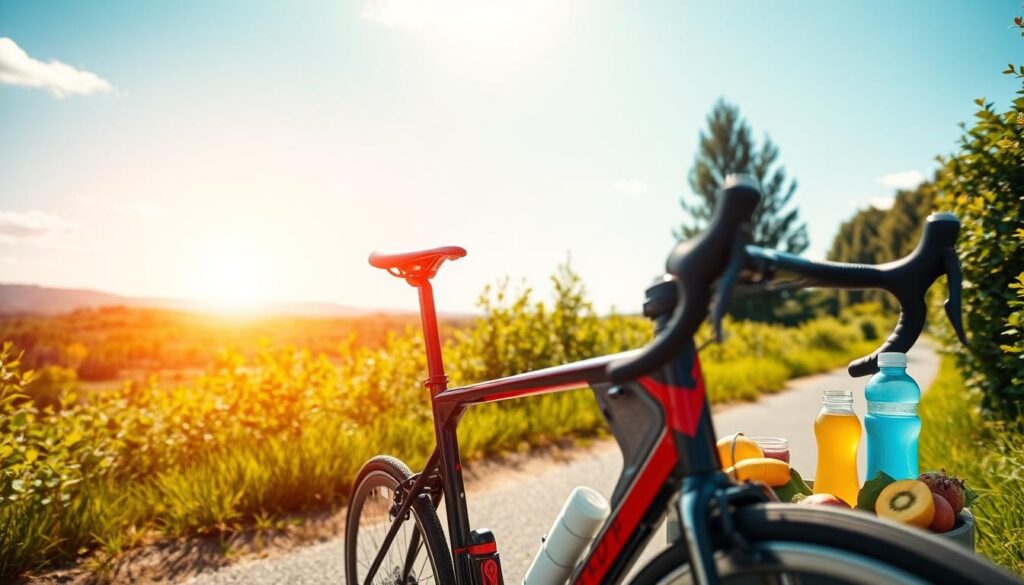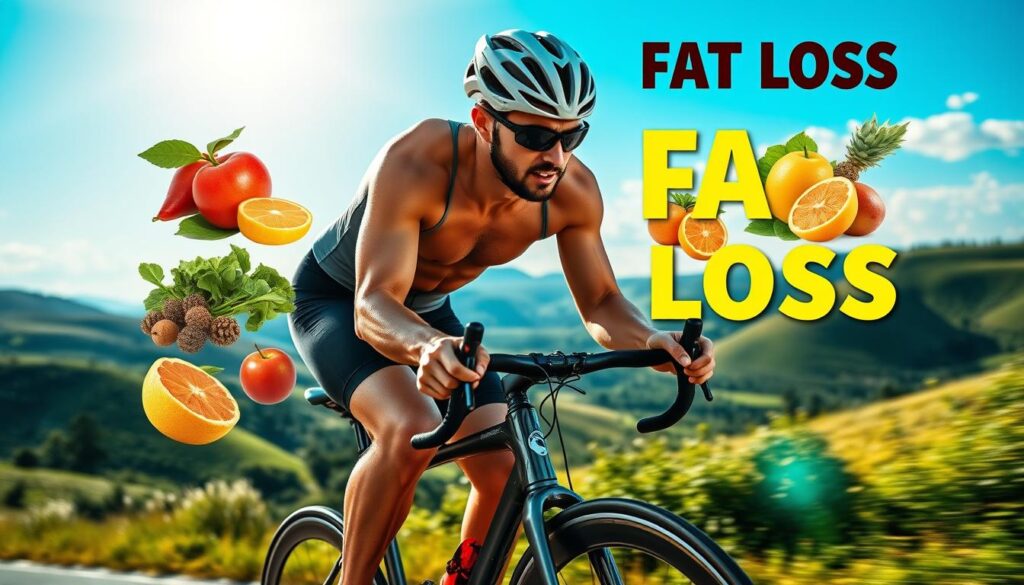Cycling is a great way to lose belly fat and reach your weight loss goals. It helps you burn fat and manage your weight better. You can use it for work or fun rides to help you lose weight.
Cycling is good for losing belly fat. Studies show that 30-60 minutes of cycling, like jogging or swimming, helps. Eating a lot of protein also helps reduce belly fat and increase good fat.
Cycling can also lower insulin resistance. This means your body absorbs glucose better. It’s great for people with weight or metabolic problems.
Key Takeaways:
- Cycling is an effective aerobic exercise for reducing overall fat, including belly fat.
- Moderate-intensity cycling for 30-60 minutes, combined with a protein-rich diet, can effectively lower belly fat and increase good cholesterol levels.
- Cycling can lower insulin resistance, leading to better glucose absorption and weight management.
- Incorporating high-intensity intervals and fasted cycling can further boost fat-burning during your cycling workouts.
- Combining cycling with strength training and a balanced diet is key for maximizing fat loss and maintaining a healthy weight.
The Science Behind Cycling and Fat Loss
Cycling is great for losing belly fat. It works because of how our bodies use energy. Let’s explore why cycling is so good at burning fat.
Understanding the Fat-Burning Zone
Fat is what our bodies use when we cycle slowly. This is called the fat-burning zone. It helps us get better at cycling and burning fat.
By cycling at a steady pace, we use more fat. This helps us lose belly fat slowly.
How Your Body Uses Fat for Energy
Weight loss is about burning more calories than we eat. Cycling helps us do this. It makes our muscles bigger and our metabolism faster.
This is especially good for women. They tend to burn fat better during exercise. This means they don’t get tired as easily.
The Role of Metabolism in Cycling
Cycling boosts our metabolism. This means we burn more calories, even when we’re not moving. Building muscle through cycling helps us do this.
This boost in metabolism is key to losing belly fat. It helps us burn calories all day, not just when we’re cycling.
Knowing how cycling helps us lose fat is important. It lets us use cycling to our advantage. We can get a flatter, healthier belly by using these principles.
Can Cycling Reduce Belly Fat: What Research Says
Research shows that regular cycling can help lose fat and keep a healthy weight. A study by Ritchie and Connell found a link between belly fat and health problems. Men tend to gain more belly fat than women.
While it’s hard to lose fat in just one spot, losing fat all over can help reduce belly fat. A 2013 study showed that working out in one area can help lose fat all over the body. Recently, a person lost 145 pounds and 22 inches from their waist by cycling for ten months.
To lose weight, it’s recommended to eat 500 calories less each day. Eating healthy foods is key to losing fat while keeping muscle. Keeping a food diary can help make better food choices and control calories.
Cycling burns about 10 calories a minute, while skipping burns nearly 20 calories a minute. Skipping is a more intense workout for losing fat. Cycling every day for 30 minutes can help lose fat and manage weight, especially belly fat.
High-intensity skipping burns a lot of calories in a short time. But, it might not be good for people with knee or joint problems. It’s important to talk to a doctor before trying it. Both cycling and skipping can help burn belly fat when done regularly.
“Belly fat is defined as a waist circumference of more than 35 inches in women and more than 40 inches in men. Research indicates that belly fat significantly elevates the risk of heart attacks, even in individuals with a normal weight.”
Belly fat is linked to high blood pressure, high cholesterol, and diabetes. Studies show that cycling can help reduce body fat, especially in those who are overweight or obese.
Interval training is better at reducing belly fat than low-intensity exercise. The “80/20 rule” or polarized training can help burn belly fat and improve fitness.
Getting Started with Fat-Burning Cycling Workouts
Ready to lose that belly fat with cycling? You’re on the right path! Cycling is a great way to burn calories and target belly fat. Start with moderate cycling, aiming for 80% of your ride at a steady pace and 20% at a bit faster.
The bike type doesn’t matter as much as how you ride it. Focus on how you move, not the bike’s look.
Essential Equipment for Weight Loss Cycling
For weight loss cycling, you need a bike that fits, a helmet, and water. A bike that fits well makes your rides more comfortable and effective. A helmet keeps you safe. And don’t forget to drink water while you ride.
Proper Bike Fit for Maximum Results
Finding the right bike fit is key for burning belly fat. Your bike should match your height, weight, and how you ride. This ensures you ride right and stay safe.
Think about getting a bike fitter to make sure your bike is perfect for you. This will help you ride better and feel more comfortable.
Safety Considerations for Beginners
New to cycling? Start with short rides. Try a 5km ride, which takes about 20-30 minutes. As you get fitter, you can ride further each week or month.
Remember, it’s better to ride a little every day than to ride a lot less often. This helps you get into a cycling habit.
| Cycling Intensity | Calories Burned (155 lbs) | Calories Burned (185 lbs) |
|---|---|---|
| Moderate (12-13.9 mph) | 298 calories/30 min | 355 calories/30 min |
| Vigorous (14-15.9 mph) | 372 calories/30 min | 444 calories/30 min |
By following these tips, you’ll be on your way to burning belly fat. Cycling is a powerful way to reach your fitness goals. Just remember to keep going and be patient. You’ll see results soon.
Indoor vs Outdoor Cycling for Fat Loss
Both indoor and outdoor cycling are great for losing weight. Indoor cycling lets you control your workout. You can focus on getting better without weather or terrain getting in the way. You can burn 400-600 calories per hour, depending on how hard you work.
Outdoor cycling is exciting because you can try new places and hills. It makes your body work harder. Plus, you get to enjoy the fresh air and beautiful views.
Choosing between indoor and outdoor cycling depends on what you like and your schedule. The most important thing is to pick what you enjoy. Whether it’s a stationary bike or riding outside, cycling can help you get in shape.
“Cycling is one of the most effective and efficient ways to burn calories and shed unwanted belly fat. The key is finding the right balance between indoor and outdoor cycling to keep your workouts engaging and sustainable.”
Success comes from doing what you love. Try both indoor and outdoor cycling to see what works best for you. With hard work and sticking to it, you’ll get the body you want.
Optimal Cycling Intensity for Maximum Fat Burn
When you cycle to burn belly fat or lose weight, how hard you pedal matters a lot. Mixing up your cycling intensity can help you burn more fat and reach your fitness goals.
High-Intensity Interval Training (HIIT)
HIIT is great for losing fat. It involves short, hard cycling bursts followed by rest. This method burns lots of calories and boosts fat loss.
Studies show that young women who did HIIT cycling 3 times a week lost a lot of body fat. They also got better insulin control after 15 weeks.
Steady-State Cardio Benefits
HIIT is powerful, but cycling at a steady pace is good too, especially for longer rides. This type of cycling burns more calories and helps with weight loss over time.
A study found that HIIT running for 10 weeks made muscles bigger. This shows that both hard and easy exercise are good.
Finding Your Perfect Training Zone
Finding the right cycling intensity for you depends on your fitness and goals. Research says cutting your diet to 80% of what you eat now and cycling for 1-2 hours daily can help you lose up to 10kg in 6 to 12 months. Try different intensities and see what works best for you.
“A study showed a significantly greater reduction in both abdominal girth and visceral adiposity among HIIT participants compared with conventional training after 8 weeks.”
Whether you do HIIT or steady-state cycling, mixing up your routine can help you burn fat better. This way, you can reach your weight loss goals.
Combining Cycling with Proper Nutrition
Getting fit through cycling is more than just riding a bike. Eating right is key to losing belly fat and getting the most from your workouts. Mix cycling with a healthy diet to burn fat better and see lasting results.
Start by eating 500 fewer calories each day for slow, safe weight loss. Eat foods that are good for you like lean meats, whole grains, and lots of fruits and veggies. Try not to snack too much and stay away from foods that are high in calories but low in quality.
Protein, carbs, and fats are all important for a good diet. Even pro cyclists enjoy treats sometimes to keep their spirits up. Drinking plenty of water is also important, especially when you’re biking for a long time. You might want to try electrolyte drinks too.
“Proper nutrition is the foundation for effective fat loss through cycling. By fueling your body with the right balance of nutrients, you can maximize the fat-burning potential of your workouts and see sustainable results.”
By cycling and eating smart, you’re on your way to losing belly fat and reaching your fitness dreams. It’s all about finding a balance and making changes that last.

Common Mistakes to Avoid During Your Weight Loss Journey
Starting your weight loss journey with cycling is exciting. But, it’s important to avoid common mistakes. These mistakes can slow down your progress. By knowing and avoiding them, you can get the most out of cycling for losing weight.
Overtraining Pitfalls
It’s easy to want to do too much. But, overtraining can hurt your progress. Too much cycling without rest can make you tired and weak. It can also make it harder to lose weight. Listen to your body and rest when it needs to.
Nutrition Errors That Hinder Progress
Good nutrition is key to losing weight. Don’t cut calories too much. This can slow down your metabolism and cause muscle loss. Eat a balanced diet that supports your cycling and health.
Recovery Mistakes to Watch For
Recovery is as important as cycling. Not resting and refueling can slow you down. Get enough sleep, eat well after working out, and do light stretching or yoga. These help your body heal and get stronger.
Avoiding these mistakes will help you reach your cycling fat loss goals. Stay focused, listen to your body, and enjoy the journey to a healthier you.
Tracking Progress and Staying Motivated
Starting a weight loss journey with cycling is exciting and rewarding. It’s key to keep motivated and track your progress. Use fitness trackers, cycling apps, and regular measurements to do this.
Setting realistic goals is crucial. Aim to lose inches or boost your power-to-weight ratio. Celebrate each success, no matter how small. This positive feedback keeps you motivated.
Vary your cycling routine to stay excited. Try new routes, terrains, or join a cycling group. This keeps workouts fresh and helps you improve.
Remember, weight loss progress isn’t always steady. Focus on long-term trends, not daily changes. Track your body composition and cycling data to understand your journey better.
“Consistency in food choices and training was key to my weight loss success. Small changes in my diet led to significant results when compounded over time.”
To stay motivated, focus on goal-setting, tracking progress, and trying new things. This approach makes cycling a fun and sustainable way to reach your fitness goals.

Conclusion
Cycling is a great way to lose belly fat and get healthier. You can ride outside or on a bike indoors. The most important thing is to find a routine you like and can keep up with.
Doing cycling regularly helps you lose fat all over, including your belly. Adding high-intensity workouts on your bike can make you burn more fat. Always listen to your body and don’t push too hard. Make sure to get enough sleep and eat well.
By cycling often, you can lose belly fat and get stronger. You’ll also improve your heart health and feel better overall. Keep going, celebrate your wins, and enjoy the path to being healthier.

